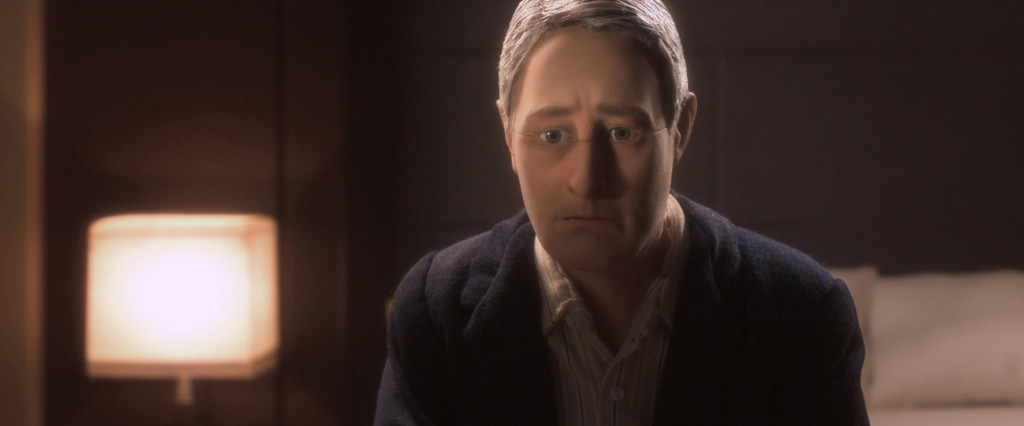Movie Review: Anomalisa
My immediate reaction when Anomalisa ended: “That movie was a trip.” It sounds simple, but this statement really makes a lot of sense, in regard to both the roller coaster of emotions that it contained, and the actual trippiness of some of the scenes.
The film was written and co-directed by Charlie Kaufman, author of the brilliant screenplays for Synecdoche, New York; Eternal Sunshine of the Spotless Mind; and Being John Malkovich – to name a few. So of course we’d laugh at the pinpoint accuracy of the portrayals of everyday people. Of course some of the imagery would be uncomfortable or difficult to watch. Of course we’d feel moments of true sadness – something a movie shouldn’t be able to make us do. And of course we’d silently ponder life for a while after the film ended, in a more profound way than we did before it began.
Analysis aside, there’s one obvious difference between this film and Kaufman’s previous efforts: the medium. Anomalisa uses stop-motion animation, a process familiar to co-director Duke Johnson (and the folks at Starburns Industries), but new to his partner. Although this movie could end up being referred to as “that puppet movie” by those only casually aware of it via the festival circuit or the recent promotion by Paramount Pictures – but unfamiliar with the actual content – there’s really nothing more fantastical about this latest effort in comparison to any of Kaufman’s previous films, and the puppetry is not simply a gimmick. In fact, it’s probably more grounded in reality than most movies.
Anomalisa centers on Michael Smith (voice of David Thewlis), a customer service expert on his way to Cincinnati for a speaking engagement. His trip is relatable: the chatty seatmate on the plane, the cab driver who talks up his town a bit too much, the cookie-cutter hotel check-in process, and the relief upon finally getting into a room and being able to unwind.
But Michael has other things on his mind. He dutifully calls his wife and son to check in. He ponders his relationship with a past flame, who we find out lives in Cincinnati, and looks her up to meet for a drink. Like their past partnership, it didn’t end well, and Michael can’t seem to figure out why, just like he couldn’t do with the relationship – only acknowledging that he thinks something is wrong with him. The problem is apparently obvious to her though, because it has always been obvious to her; when it comes to relationships, some things never change.
Michael’s confusion and emotional instability is only beginning to escalate at this point. He soon finds himself in the hotel room of two young-ish women, both fans of his teachings (customer service experts have fans?) in town to hear him speak. Although one is clearly supposed to be the more beautiful and outgoing one, Michael sees something different in the other, Lisa, voiced by Jennifer Jason Leigh.
Her uniqueness is clear to the audience too, because she has a different voice than everybody else. That’s not a metaphor; she literally is the only character other than Michael that doesn’t sound exactly like all the rest. Not only compared to the other women in the film (his former lover & his current wife), but also his son, the hotel clerk, the cabbie, and the guy on the plane. Tom Noonan voices all of them, and it’s not just for the sake of convenience. We learn that this is the main source of Michael’s lack of contentment, his ennui. He hears everyone speak in the same familiar, bland voice and is just looking for something different – someone different – to finally give him the happiness he seeks. Like the rest of us, he’s simply searching for that anomaly that is unlike any other.
But how do we know who is a true outlier in our lives? How do we know if they will always remain that way? How does one go from being an anomaly to just another face in the crowd? (Or voice in the crowd?) How does the one end up becoming just another one?
This is the simple core concept at the heart of Anomalisa. However, this “simple” concept has a much more complex explanation, and thus the film utilizes an even more intricate vehicle in its presentation. Using animation allowed for the illustration of the inner workings of the human mind – in all it’s vivid, intense, and terrifying glory. The medium allowed for fear to be visualized, panic to be felt, darkness to be truly engrossing, and insanity to be shown as both subtle and explicitly obvious.
Yet we don’t necessarily see the protagonist as crazy. We don’t view his hallucinations as signs of mental illness. We don’t shun Michael as a lunatic.
Therein lies the key to Charlie Kaufman’s expertise in both this film and his previous efforts. The audience can look at something they’ve never seen before – never even imagined – and almost instantly relate to it. This is because every strength that Kaufman possesses as a filmmaker is present once again in Anomalisa:
It may be hard for some to watch the awkward, graphic, puppet-sex scene, but the same would be true of the real thing. Movies, pornographic and not, are polished and perfected – not clumsy, tentative, or unflattering.
Humorous situations may seem absurd, but upon further examination, can actually hold a kernel of truth.
Trippy sequences can appear to bend reality, but any viewers who have ever experienced intense emotion – say, a panic attack – know that real life can sometimes take a backseat for several petrifying, paralyzing moments.
And imperfect characters often get harshly judged by us on the big screen, even though when we encounter people close to us with the same personality traits – family members, friends, ourselves – we’re suddenly capable of a lot more sympathy.
A good screenwriter, a good director, a good author, musician, artist, etc. can make you realize that something unfamiliar might actually be relatable, and that our array of emotions are universally shared by all. Losing yourself in a movie isn’t always an enjoyable experience; it depends on the content. Some people might be turned off by the fact that they have to face unpleasant emotional demons on screen in such an imposing way. Maybe it’s too striking. Maybe it’s too real. Or maybe it’s about realizing one of the most visually unique pieces of cinema, and one of the strangest instances of stop-motion animation ever undertaken in a major motion picture is not as weird as we thought it would be. And the heaviness is not as far from our own lives as we hoped it would be. Maybe in seeing, feeling, understanding – and yes, enjoying – Anomalisa, we find it isn’t such an anomaly after all.
It’s the most familiar thing we’ve never seen.
SCORE





























Hi Ashley, thank you so much for reading and we love the feedback. Note that on that day we had 14th posts go up and only ten posts show on the front page, so it's possible the preview had already been archived by the time you got to it. One recommendation would be to add our RSS feed to your favorite news aggregator service like Feedly, this way you get all of the latest posts!